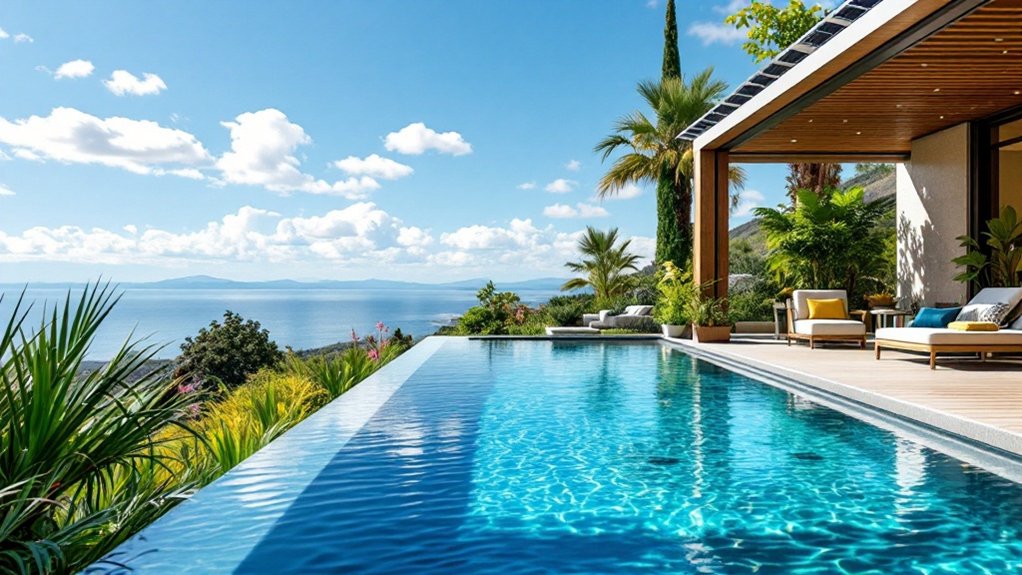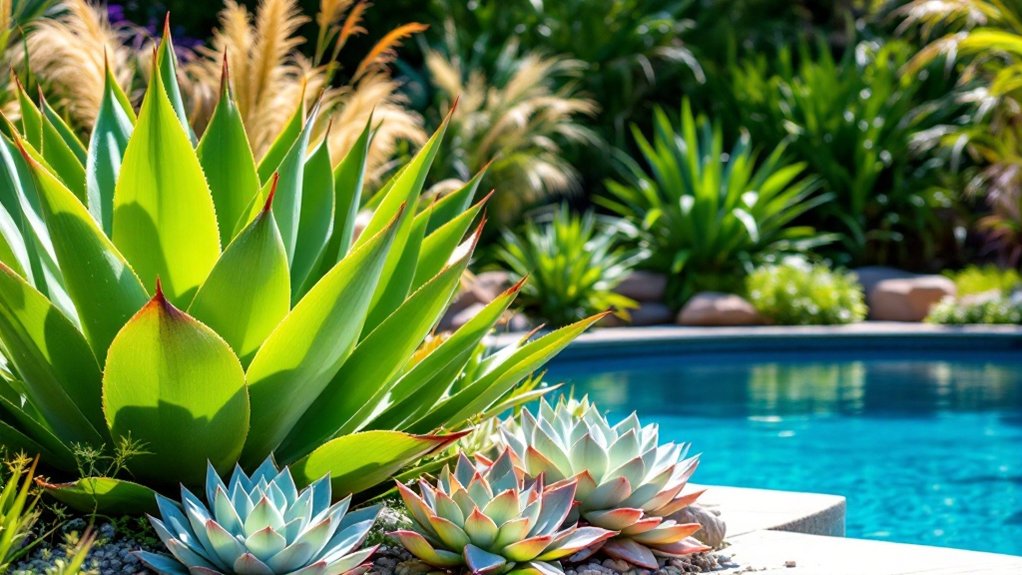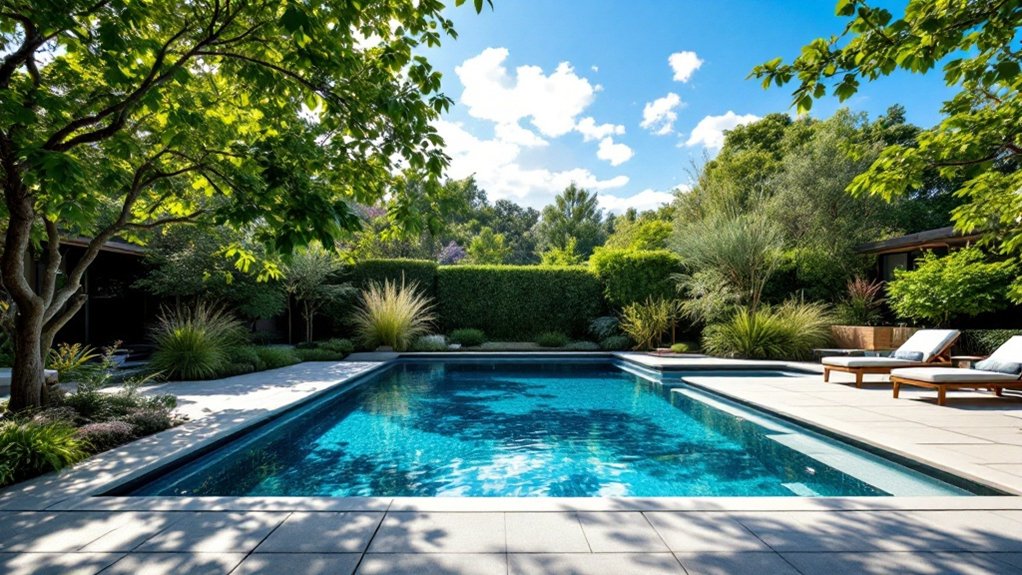Sustainable pool designs are increasingly relevant in today’s environmentally conscious society. These designs utilize innovative techniques and materials to reduce water and energy consumption. Natural filtration systems and smart water management are just a few examples of how pools can be both functional and eco-friendly. As more homeowners seek responsible leisure options, the question arises: what specific technologies and practices are shaping the future of sustainable pools?
The Rise of Eco-Friendly Pool Designs
As homeowners increasingly prioritize sustainability, eco-friendly pool designs have emerged as a popular choice. These innovative designs incorporate materials and technologies that minimize environmental impact while enhancing the swimming experience. Many new pools feature energy-efficient pumps and heaters, considerably reducing energy consumption. Additionally, solar panels are becoming commonplace, harnessing the sun’s energy to power pool systems.
The use of natural materials, such as stone and wood, replaces traditional concrete, promoting a more harmonious relationship with the surrounding environment. Furthermore, many homeowners are opting for smaller, more compact pools that require less water and maintenance. This shift towards eco-friendly designs reflects a growing awareness of ecological responsibilities and a desire to create beautiful outdoor spaces that align with sustainable living principles. Additionally, integrating gas pool heaters can provide efficient warmth, ensuring pool usability throughout the year without excessive energy consumption.
Natural Filtration Systems: A Cleaner Alternative
Natural filtration systems offer an eco-friendly alternative to traditional pool cleaning methods. By utilizing natural processes and materials, these systems can enhance water quality while reducing chemical usage. The benefits of adopting such systems extend beyond environmental impact, promoting a healthier swimming experience for users.
Eco-Friendly Filtration Methods
While traditional pool filtration systems often rely on chemical treatments and energy-intensive processes, eco-friendly filtration methods present a cleaner, more sustainable alternative. These systems utilize natural materials, such as sand, gravel, and plant life, to filter water without harmful chemicals. Natural filtration systems, like biofilters, harness beneficial microorganisms to break down contaminants, promoting a balanced ecosystem within the pool environment. Additionally, some eco-friendly methods incorporate UV light technology, which effectively disinfects water without chemical byproducts. By minimizing energy consumption and chemical usage, these filtration techniques support environmentally responsible pool ownership. They not only reduce the ecological footprint of maintaining a pool but also contribute to healthier swimming conditions for users, aligning with the growing demand for sustainable practices in recreational water management.
Benefits of Natural Systems
Eco-friendly filtration methods pave the way for natural systems that offer numerous benefits for pool owners. These systems utilize biological processes to maintain water clarity and quality, greatly reducing the need for harsh chemicals. They create a balanced ecosystem within the pool, fostering beneficial microorganisms that naturally purify the water. This approach not only enhances the swimming experience but also promotes environmental sustainability by minimizing chemical runoff and water pollution. Additionally, natural filtration systems often require less energy to operate, leading to lower utility costs. Maintenance is typically simpler, as these systems are designed to work harmoniously with their surroundings. Overall, embracing natural filtration offers a cleaner, healthier alternative that aligns with sustainable living principles.
Smart Water Management Solutions
How can pool owners effectively manage water usage in a sustainable manner? Smart water management solutions offer innovative strategies to optimize water consumption. These solutions include automated systems that monitor water levels, evaporation rates, and weather conditions, ensuring that pools maintain the ideal water balance while minimizing unnecessary usage. In addition, rainwater harvesting systems can be integrated, allowing pool owners to collect and utilize rainwater for pool filling or maintenance. Advanced filtration technologies also play a critical role, reducing water waste during cleaning processes. Moreover, utilizing smart sensors can alert owners to leaks or irregular water loss, enabling prompt repairs. By implementing these technologies, pool owners can greatly enhance water efficiency, contributing to sustainable pool management practices. Furthermore, regular pipe cleaning can improve circulation and balance chemical levels, further promoting efficient water use.
Energy-Efficient Pool Heating Options
As pool owners seek to extend their swimming seasons, energy-efficient pool heating options present a sustainable solution that reduces both energy consumption and costs. Solar pool heaters, which harness sunlight to warm water, are among the most environmentally friendly choices, utilizing renewable energy effectively. Heat pumps, another viable option, extract heat from the air and transfer it to the pool, making them highly efficient even in cooler climates. Additionally, electric resistance heaters offer quick heating but may be less cost-effective over time. Implementing a pool cover further enhances energy efficiency by minimizing heat loss during the night. By selecting appropriate heating methods, pool owners can enjoy comfortable swimming conditions while promoting sustainability and reducing their overall environmental impact. Regular inspections of heater fan motors ensure efficient operation and optimal heating performance.
Sustainable Materials for Pool Construction
The choice of materials used in pool construction greatly impacts the sustainability of the overall project. Eco-friendly options such as recycled glass, natural stone, and sustainably sourced wood can greatly reduce the environmental footprint. Additionally, concrete alternatives like rammed earth or pervious concrete allow for better water drainage and reduce runoff. Utilizing low-VOC (volatile organic compounds) paints and sealants minimizes harmful emissions, promoting healthier environments. Integrating local materials decreases transportation emissions and supports regional economies. Moreover, the use of solar-reflective tiles can enhance energy efficiency by reducing heat absorption. By selecting sustainable materials, pool builders can create functional, aesthetically pleasing, and environmentally responsible pools that align with eco-conscious values and contribute to long-term resource conservation.
Innovations in Pool Covers and Their Benefits
Innovations in pool covers are transforming the way homeowners approach energy efficiency and sustainability. By incorporating eco-friendly materials and automated systems, these covers enhance thermal efficiency while reducing environmental impact. The advancements in this area not only improve pool maintenance but also contribute greatly to energy savings.
Thermal Efficiency Enhancement
While many pool owners seek ways to enhance their leisure experience, advancements in thermal efficiency through innovative pool covers offer significant benefits. These modern covers are designed to minimize heat loss, effectively retaining warmth during cooler nights. By utilizing materials that reflect sunlight, they help maintain ideal water temperatures, reducing the need for excessive heating. Furthermore, many designs incorporate insulation properties that further enhance energy conservation. As a result, pool owners can enjoy longer swim seasons while simultaneously lowering energy costs. Additionally, improved thermal efficiency contributes to water conservation, as less evaporation occurs in well-covered pools. Overall, these innovations not only elevate the recreational value of swimming pools but also promote environmentally responsible practices among homeowners.
Eco-Friendly Material Options
As pool owners increasingly prioritize sustainability, eco-friendly material options for pool covers have emerged as a significant innovation. These materials, often made from recycled plastics, natural fibers, or biodegradable substances, contribute to reducing environmental impact while maintaining functionality. By utilizing such alternatives, pool covers can minimize water evaporation, thereby conserving precious resources and reducing chemical usage. Additionally, eco-friendly covers offer enhanced durability, often requiring less frequent replacement, which further supports sustainability efforts. Manufacturers are also focusing on lightweight designs that ease installation and handling, making them more user-friendly. Ultimately, adopting eco-friendly material options for pool covers not only benefits the environment but also aligns with the growing trend of responsible consumerism in the pool industry.
Automated Cover Systems
Automated cover systems represent a significant advancement in pool cover technology, enhancing both convenience and safety for pool owners. These systems utilize electric or solar-powered mechanisms to open and close covers with minimal effort, making routine maintenance more manageable. In addition to ease of use, automated covers contribute to water conservation by reducing evaporation and keeping debris out of the pool, thereby minimizing the need for chemicals and cleaning. Safety features are also prominent, as these covers can prevent accidental drownings, providing peace of mind for families. Moreover, many automated covers are designed to blend seamlessly with pool aesthetics, ensuring that functionality does not compromise the overall appeal of the outdoor space. Consequently, automated cover systems offer a blend of practicality and sustainability.
Landscaping for Water Conservation Around Pools
When designing landscaping around pools, incorporating water conservation strategies is essential for creating a sustainable environment. Native plants, which require less water and maintenance, can thrive in local climates and reduce irrigation needs. Additionally, xeriscaping techniques, such as grouping plants with similar water requirements, minimize water usage while enhancing aesthetic appeal. Implementing permeable paving around pool areas allows rainwater to infiltrate the ground, replenishing aquifers and reducing runoff. Mulching around plants retains soil moisture and prevents evaporation, further conserving water. Incorporating rain gardens near poolside can effectively manage stormwater runoff, improving water quality. Ultimately, thoughtful landscaping choices not only enhance the visual appeal of pools but also contribute greatly to sustainable water management practices.
Frequently Asked Questions
How Do I Maintain My Eco-Friendly Pool Year-Round?
To maintain an eco-friendly pool year-round, regular cleaning, efficient filtration, and chemical balancing are essential. Additionally, incorporating energy-efficient equipment and monitoring water levels can greatly enhance sustainability and reduce overall resource consumption.
What Is the Average Cost of Sustainable Pool Installations?
The average cost of sustainable pool installations typically ranges from $50,000 to $100,000, depending on various factors like design complexity, materials used, and additional eco-friendly features integrated into the overall pool system.
Are Eco-Friendly Pools Suitable for All Climates?
The suitability of eco-friendly pools varies across climates. In warmer regions, they thrive, while colder areas may face challenges. Local conditions and maintenance practices ultimately determine their effectiveness and adaptability in different environments.
Can I Retrofit My Existing Pool With Sustainable Technologies?
Retrofitting an existing pool with sustainable technologies is often feasible. Homeowners may explore options such as energy-efficient pumps, solar heating systems, and advanced filtration methods to enhance water conservation and reduce environmental impact effectively.
What Are the Long-Term Benefits of Sustainable Pool Designs?
The long-term benefits of innovative designs encompass reduced operational costs, enhanced energy efficiency, improved water conservation, and increased property value. Additionally, they promote environmental stewardship, ensuring a healthier ecosystem for future generations to enjoy.
Conclusion
To sum up, sustainable pool designs and water-saving technologies represent a significant advancement in creating environmentally responsible leisure spaces. By integrating natural filtration systems, smart water management, energy-efficient heating, and eco-friendly materials, pool owners can enjoy enhanced aesthetics and functionality while conserving essential resources. These innovations not only reduce environmental impact but also cater to the growing demand for sustainable practices in recreational settings, ultimately promoting a healthier relationship with nature.




